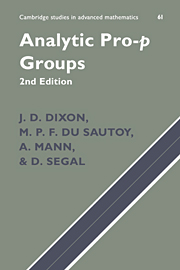Book contents
- Frontmatter
- Contents
- Preface
- Introduction
- Notation
- Prelude A reminder
- Part I Pro-p groups
- 1 Profinite groups and pro-p groups
- 2 Powerful p-groups
- 3 Pro-p groups of finite rank
- 4 Uniformly powerful groups
- 5 Automorphism groups
- Interlude A ‘Fascicule de résultats’: pro-p groups of finite rank
- Part II Analytic groups
- Part III Further topics
- Appendix A The Hall–Petrescu formula
- Appendix B Topological groups
- Bibliography
- Index
4 - Uniformly powerful groups
Published online by Cambridge University Press: 03 December 2009
- Frontmatter
- Contents
- Preface
- Introduction
- Notation
- Prelude A reminder
- Part I Pro-p groups
- 1 Profinite groups and pro-p groups
- 2 Powerful p-groups
- 3 Pro-p groups of finite rank
- 4 Uniformly powerful groups
- 5 Automorphism groups
- Interlude A ‘Fascicule de résultats’: pro-p groups of finite rank
- Part II Analytic groups
- Part III Further topics
- Appendix A The Hall–Petrescu formula
- Appendix B Topological groups
- Bibliography
- Index
Summary
In the previous chapter, we saw that every pro-p group of finite rank has an open normal subgroup which is powerful. In this chapter we show that this subgroup may be chosen so as to satisfy a slightly stronger condition, that of being ‘uniformly powerful’. We then show that uniformly powerful groups have a remarkable property: the group operation can be ‘smoothed out’, to give a new, abelian, group structure, and this new abelian group is in a natural way a finitely generated free ℤp-module.
When, in Part II, we come to consider a pro-p group of finite rank as an analytic group, we shall see that this ℤp-module structure provides a natural co-ordinate system on the group. More immediately, we obtain, free of charge, a faithful linear representation for the automorphism group of any uniformly powerful pro-p group.
Uniform groups
Definition A pro-p group G is uniformly powerful if
(i) G is finitely generated,
(ii) G is powerful, and
(iii) for all i, |Pi(G) : Pi+1(G)| = |G : P2(G)|.
We shall usually abbreviate ‘uniformly powerful’ to ‘uniform’.
If G is a pro-p group satisfying (i) and (ii) of this definition, then we know from Theorem 3.6 that the pth power map x ↦ xp induces an epimorphism fi : Pi(G)/Pi+1(G) → Pi+1(G)/Pi+2(G), for each i; condition (iii) of Definition 4.1 is clearly equivalent to:
(iii)′ for each i ≥ 1, the map fi is an isomorphism.
- Type
- Chapter
- Information
- Analytic Pro-P Groups , pp. 61 - 86Publisher: Cambridge University PressPrint publication year: 1999



